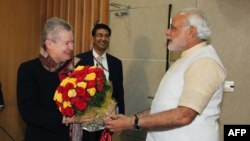United States ambassador to India Nancy Powell has met with Indian opposition leader Narendra Modi, who could become India's next prime minister.
Powell and Modi met Thursday at his official residence in Gandhinagar, the state capital of Gujarat, where he is chief minister. Modi presented Powell with a bouquet of flowers and video footage showed the two of them sitting in a meeting room, but neither spoke to reporters after the talks.
The meeting represents a change in the United States' stance on Modi, a Hindu nationalist. Washington revoked Modi's U.S. visa in 2005 following criticism of his handling of anti-Muslim riots in 2002 in Gujarat. The violence left more than 1,000 people dead.
A U.S. embassy spokesman has said Modi's meeting with Ambassador Powell is part of a "concentrated outreach to senior political and business leaders" to highlight the U.S.-India relationship.
Modi could become prime minister if his Bharatiya Janata Party (BJP) performs well in the upcoming parliamentary elections, as recent polls suggest.
The Congress party of Prime Minister Manmohan Singh is lagging well behind the opposition BLP in opinion polls, with voters turned off by an economic slowdown and a string of corruption scandals.
The 81-year-old Singh, who is retiring after two terms, has said it would be "disastrous" if Modi became prime minister.
Modi denies wrongdoing in the anti-Muslim riots, which are believed to have been sparked when Muslims set fire to a train carrying Hindu pilgrims. Late last year, an Indian court ruled there was not enough evidence to prosecute him.
Supporters claim that since the violence, Modi's record of steady governance, development and growth has won over voters, including Muslims, across Gujarat's 60 million people.
Powell and Modi met Thursday at his official residence in Gandhinagar, the state capital of Gujarat, where he is chief minister. Modi presented Powell with a bouquet of flowers and video footage showed the two of them sitting in a meeting room, but neither spoke to reporters after the talks.
The meeting represents a change in the United States' stance on Modi, a Hindu nationalist. Washington revoked Modi's U.S. visa in 2005 following criticism of his handling of anti-Muslim riots in 2002 in Gujarat. The violence left more than 1,000 people dead.
A U.S. embassy spokesman has said Modi's meeting with Ambassador Powell is part of a "concentrated outreach to senior political and business leaders" to highlight the U.S.-India relationship.
Modi could become prime minister if his Bharatiya Janata Party (BJP) performs well in the upcoming parliamentary elections, as recent polls suggest.
The Congress party of Prime Minister Manmohan Singh is lagging well behind the opposition BLP in opinion polls, with voters turned off by an economic slowdown and a string of corruption scandals.
The 81-year-old Singh, who is retiring after two terms, has said it would be "disastrous" if Modi became prime minister.
Modi denies wrongdoing in the anti-Muslim riots, which are believed to have been sparked when Muslims set fire to a train carrying Hindu pilgrims. Late last year, an Indian court ruled there was not enough evidence to prosecute him.
Supporters claim that since the violence, Modi's record of steady governance, development and growth has won over voters, including Muslims, across Gujarat's 60 million people.





